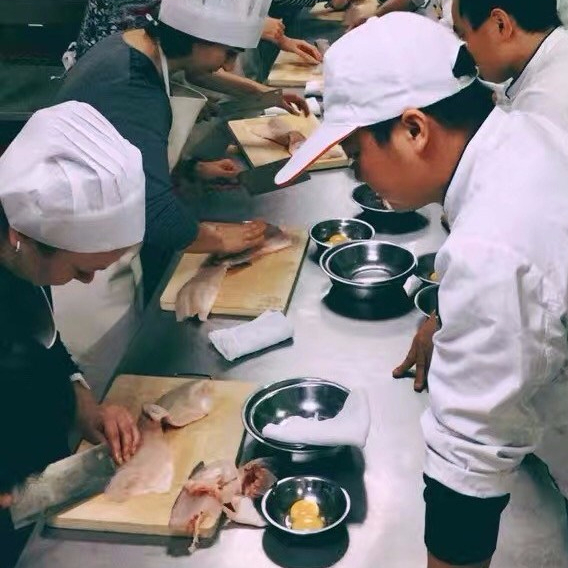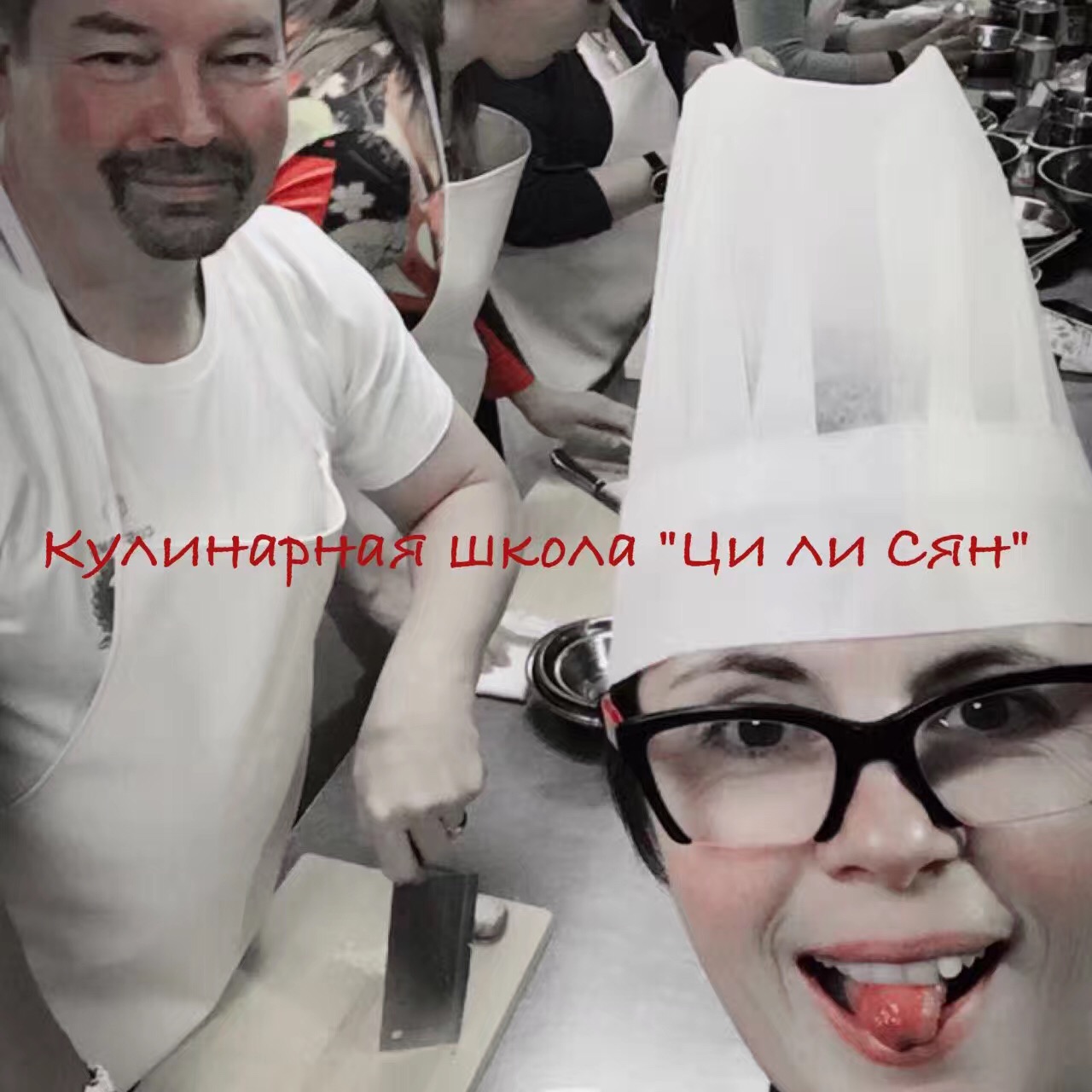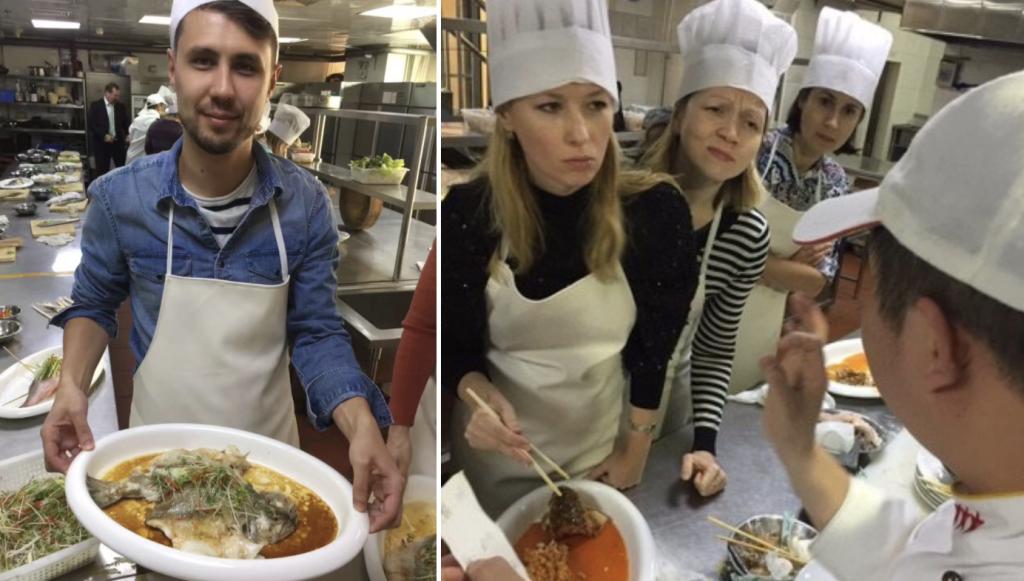by Zoya Rusinova

Elena Timofeeva, a happy housewife and mother, moved to Beijing from Moscow more than 20 years ago. Raising her daughter far from her native land, she never imagined that one day she would call herself an entrepreneur.
Timofeeva is a tall, beautiful woman with an insightful gaze. Her outward appearance gives the impression of a strict and serious person, but in reality she is very kind, understanding and open-minded.
Her white shirt glows in contrast with her short black hair, and the red embroidery on her left shoulder shines, too. The embroidery could be the motto for Elena Timofeeva’s new life.
“Life is to short to wait. Let’s do it,” it declares.
The founder of one of the most famous culinary schools in Beijing, she, along with Chinese chefs, teaches foreigners how to cook Gong Bao Ji Ding, stir-fried spicy chicken, known in the West as Kung Pao chicken.
For a successful entrepreneur in China, Timofeeva breaks many of the rules. She has no business training. Her education is in art. And she cannot even speak Mandarin.
“I lived in Beijing but didn’t communicate with people a lot,” Timofeeva said, moving her glasses in a dark purple rim on her forehead, recalling her memories. “I was focused on my daughter’s education, but when she grew up, as any mother, I asked myself, how can I organize suddenly appeared lots of free time?”
The Stroganov Art Academy graduate found a way to spice up her life. While many young entrepreneurs are seeking ideas to build their own startups, Timofeeva was pretty sure of the path she wanted to follow.

The idea to open a cooking school first came into her head when Timofeeva’s husband, a news correspondent in China, found some
freelance work doing translation for Russian chefs who worked in
Beijing’s restaurant industry. A cooking enthusiast,
he came up with an idea for her to organize cooking courses for
foreigners. The courses would appeal to expatriates, to visitors travelling for tourism or business trips, and any person interested in cooking Chinese
cuisine. However, career building, children and other circumstances postponed it.

Elena with her husband Konstantin Toporkov. Photo courtesy of Elena Timofeeva.
“I remember when Elena came to me and said, “I know that 20 years ago it was your idea,” Timofeeva’s husband Konstantin said, smiling, recalling memories. “But if we do this now, just stay away from it. I’ll do everything by myself.”
A year ago Timofeeva’s desire to start her own business was strong enough that, in cooperation with Ci Li Xiang, a traditional Chinese cuisine restaurant (which in translation from Chinese means “Fragrance from seven Li afar”), she opened the cooking school that attracts students who want to learn how to cook traditional Chinese food. From simple snacks to butterfly fish in sweet and sour sauce, the school maintains the quality and taste of its food at a very high level. It provides classes twice per week and attracts dozens of participants.

The restaurant owner is a good friend of Elena’s family, so Timofeeva was very familiar with his business. She knew everything – from which products restaurants use to how clean the kitchen must be, to the company’s financial documents. Everything was transparent, and it became the decisive factor, in convincing Elena to start. The new entrepreneur was very exacting in the kitchen, a spacious and clean room with huge metal tables and the latest kitchen appliances (which make it comfortable for a large number of students). The cooperation with Ci Li Xiang provided high-quality service to her clients.
Still, there were many challenges for the new entrepreneur, from keeping up an official WeChat account with hundreds of followers to meeting the challenges caused by the simple fact that Timofeeva is a foreigner who wants to run her business in China.
Foreigners in China face a wide range of difficulties in doing business. A telling example is the problem of corruption. According to Business Insider, corruption is rampant in Chinese business and often goes unchecked. Payoffs and bribes are frequently factored into the cost of doing business, and it is endemic. But in China it is difficult to predict who is going to require a payment – or if what’s perceived as a “bribe” by Western standards is actually a display of respect in China. When Elena started her business, she expected to give bribes, as well, but cooperation with Chinese people who were her close friends helped her escape the corruption trap.
One of the other biggest challenges that foreigners face in China is cultural misunderstandings. Although there are an increasing number of Chinese people highly proficient in English, it is uncommon to find someone who understands the subtleties of the language and possesses a strong enough understanding of both Chinese and Western culture to navigate delicate business negotiations. Another word foreigners often hear, while doing business in China is “guanxi.” Translated into English, the word means relationship. The importance of building strong relationships in business is not a new concept for Western businesses. However, in China, guanxi plays a far more important role than in the West.
“Sometimes you need guanxi,” Dan Harris, legal blogger, who specialized on China’s law, said. “As a skeleton key that will magically unlock doors, when any other method doesn’t work out.”
Cross-cultural communication and difficulties to communicate with Chinese people became the biggest challenge for Elena, as well. Despite strong “guanxi” with her partners, she still needed to find a way to communicate with them “in
the kitchen.” Differences in mindset and different
languages led to misunderstandings between chefs
and students. The professional translation job didn’t
always work out, because the main question was how to
teach Chinese chefs to teach foreigners.

Today, the Russian entrepreneur’s colleagues are not only
good chefs but also excellent teachers. Every time the professional translator is in class. Ci
Li Xiang’s main purpose is to make every student
understand the entire process and enjoy the
cooking.

Another challenge was the way of online communication. It is impossible to operate a business in China without using the WeChat social media platform. A housewife and a former artist who had never used online platforms, she had a lot of catching up to do. However, Timofeeva’s persistence and strong belief in herself paid off. She mastered social media and online community building. She runs her business by herself, using WeChat for everything – promotion, payment, and communication with staff and students.
Today, Ci Li Xiang cooking school operates only in Beijing. It became very popular among foreigners, especially Russians. Classes often fill up 30 minutes after the registration process starts online. People are ready to wait a couple of weeks to have a chance to cook in Elena’s kitchen.
“I tried to register for the class at least three or four times,” Timofeeva’s student Alina Olunoku said. “Finally, after one month, I had a chance to cook at Ci Li Xiang. I’d never imagine that cooking could be so fascinating and easy.”
Instead of going global and expanding to other cities in China, Elena chose a different path for business development. Beginning next year, she will be cooperating with tourism agencies, and offer cooking courses to travelers.
“I want to give people a chance not only eat Chinese food while being in China,” Timofeeva said, “but also learn how to make it and share in China’s cooking traditions, which are a significant part of Chinese culture.”
By the end of the year, Ci Li Xiang founder plans to finish and publish a cook book with Chinese recipes for foreigners – stir-fried Kung Pao chicken with peanuts, West Lake fish in vinegar sauce and other specialties of Chinese cuisine with detailed explanations of ingredients and recommendation of the supermarkets and markets where you can buy them, wherever you stay in China, Russia or any other country.

“Of course there are ups and downs, but I always remember where I started and where do I want to be. It keeps me moving forward.”

